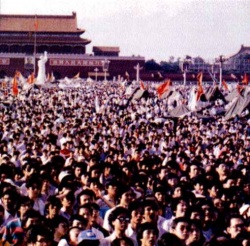“Thirty-Fifth of May”的版本间的差异
来自China Digital Space
| 第1行: | 第1行: | ||
五月三十五日 (wǔ yuè sānshíwǔ rì): Thirty-Fifth of May | 五月三十五日 (wǔ yuè sānshíwǔ rì): Thirty-Fifth of May | ||
| − | In China, important dates are usually referred to by the date on which they occurred. | + | [[File:tiananmen.jpg|250px|thumb|left|''Protesters in Tiananmen, 1989.'']]In China, important dates are usually referred to by the date on which they occurred. The Tiananmen Square Massacre is called “June 4th,” or simply “Six-Four” (六四 liùsì), and often written as “64.” Since these terms are all [[sensitive porcelain|sensitive words]] that alert web censors, netizens came up with a new way to mark the date, writing instead about the “Thirty-Fifth of May.” |
| − | + | In the run-up to the 20th anniversary of the Tiananmen Massacre, blog posts by [http://chinadigitaltimes.net/2009/06/personal-history-a-june-deserter/ “Deserter”] and [http://chinadigitaltimes.net/2009/06/the-adventures-of-an-average-city-dweller/ “17 Cats and Fish”] reflected boldly on the time and place. “17” bypassed censors with references to “Something Something Square.” | |
| − | + | Novelist Yu Hua described the “spirit of May 35th”—in essence [[grass-mud horse|grass-mud horsism]]—in a 2011 [http://chinadigitaltimes.net/2011/06/yu-hua-the-spirit-of-may-35th/ essay] for the New York Times. | |
| − | [ | + | As the censors catch on to code words for Tiananmen, netizens must find more and more veiled terms. In June 2013, even [http://chinadigitaltimes.net/2013/06/sensitive-words-24th-anniversary-of-tiananmen/ the number “35” was blocked from search results on Sina Weibo]. |
| + | |||
| + | <feed url="feed://chinadigitaltimes.net/china/1989-protests/feed/" entries="5"> | ||
| + | |||
| + | == [{PERMALINK} {TITLE}] == | ||
| + | |||
| + | '''{DATE}, by {AUTHOR}''' | ||
| + | </feed> | ||
[[Category: Grass-Mud Horse Lexicon]] | [[Category: Grass-Mud Horse Lexicon]] | ||
2013年6月11日 (二) 13:05的版本
五月三十五日 (wǔ yuè sānshíwǔ rì): Thirty-Fifth of May
In China, important dates are usually referred to by the date on which they occurred. The Tiananmen Square Massacre is called “June 4th,” or simply “Six-Four” (六四 liùsì), and often written as “64.” Since these terms are all sensitive words that alert web censors, netizens came up with a new way to mark the date, writing instead about the “Thirty-Fifth of May.”
In the run-up to the 20th anniversary of the Tiananmen Massacre, blog posts by “Deserter” and “17 Cats and Fish” reflected boldly on the time and place. “17” bypassed censors with references to “Something Something Square.”
Novelist Yu Hua described the “spirit of May 35th”—in essence grass-mud horsism—in a 2011 essay for the New York Times.
As the censors catch on to code words for Tiananmen, netizens must find more and more veiled terms. In June 2013, even the number “35” was blocked from search results on Sina Weibo.
<feed url="feed://chinadigitaltimes.net/china/1989-protests/feed/" entries="5">
[{PERMALINK} {TITLE}]
{DATE}, by {AUTHOR} </feed>





